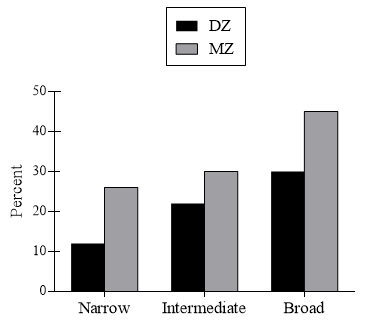P813
Twin and adoption studies have provided extensive evidence for the role of genetics in addiction. Collectively, these studies have indicated that genetics play an important, though not exclusive, role in substance abuse, as drug and alcohol use in adopted children is largely related to that of their biological (not adoptive) parents. Studies examining monozygotic and dizygotic twins allow researchers to compare genetic and environmental influences directly by studying the concordance rates of given traits or disorders.
One study examined the influence of alcohol use and dependence by comparing adopted monozygotic and dizygotic female twins. Using narrow (alcoholism with dependence-tolerance), intermediate (alcoholism with or without dependence-tolerance), and broad (alcoholism with or without dependence-tolerance or problem drinking) definitions of alcoholism, the researchers interviewed 1033 twin pairs about their alcohol use. Overall prevalence rates of narrow, intermediate, and broad definitions of alcoholism did not differ significantly between monozygotic and dizygotic twins, allowing the researchers to compare concordance rates between these two groups. The figure below depicts the concordance rates found in the study.

Figure 1. Concordance rates of alcoholism in monozygotic (MZ) and dizygotic (DZ) twins using narrow, intermediate, and broad definitions of alcoholism.
.
Find an error? Take a screenshot, email it to us at error@mytestingsolution.com, and we’ll send you $3!
